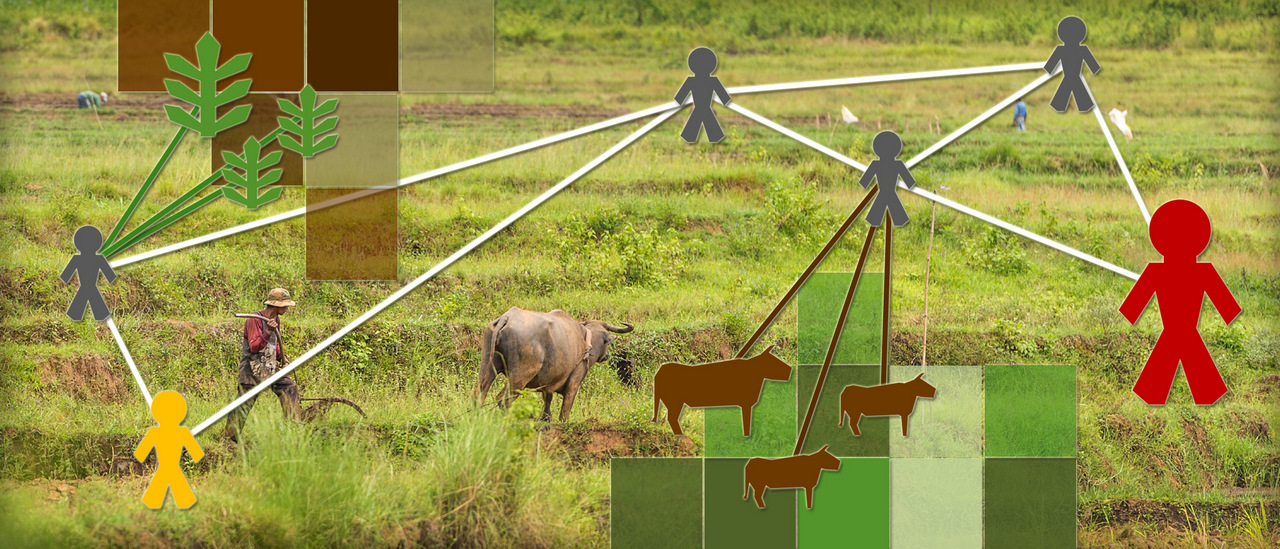Socio-Ecological Modelling

Humans shape Earth’s ecosystems through a wide range of activities such as farming, mining, building of infrastructure or the declaration of protected areas. We use dynamic social-ecological modelling, in particular agent-based modelling, to enhance the understanding of connections between human behaviour and emerging land use patterns under different processes of global change. This approach allows taking into account micro-scale interactions of households, links between social and ecological system components, and cross-scale effects of global policies (through their locally installed instruments) on local land use strategies. Suitable policies which lead to sustainable land use practices can only be derived if humans are represented in simulation models in an appropriate way, e.g. considering their social contexts and their cognitive abilities. Therefore, a particular focus of our group lies on the adequate representation of human decision making in agent-based models of natural resource use and its theoretical and empirical foundation.
Selected Publications
- Huber, R., Bartkowski, B., Brown, C., El Benni, N., Feil, J.-H., Grohmann, P., Leonhardt, H., Mitter, H., Müller, B. (2024):
Farm typologies for understanding farm systems and improving agricultural policy
Agric. Syst. 213 , art. 103800 10.1016/j.agsy.2023.103800 - Anderies, J.M., Cumming, G.S., Clements, H.S., Lade, S.J., Seppelt, R., Chawla, S., Müller, B. (2022):
A framework for conceptualizing and modeling social-ecological systems for conservation research
Biol. Conserv. 275 , art. 109769 10.1016/j.biocon.2022.109769 - Dressler, G., Groeneveld, J., Hetzer, J., Janischewski, A., Nolzen, H., Rödig, E., Schwarz, N., Taubert, F., Thober, J., Will, M., Williams, T., Wirth, S.B., Müller, B. (2022):
Upscaling in socio-environmental systems modelling: Current challenges, promising strategies and insights from ecology
Socio-Environmental Systems Modelling 4 , art. 18112 10.18174/sesmo.18112 - Jäger, F., Rudnick, J., Lubell, M., Kraus, M., Müller, B. (2022):
Using Bayesian belief networks to investigate farmer behavior and policy interventions for improved nitrogen management
Environ. Manage. 69 (6), 1153 - 1166 10.1007/s00267-022-01635-6 - Drechsler, M. (2021):
Impacts of human behaviour in agri-environmental policies: How adequate is homo oeconomicus in the design of market-based conservation instruments?
Ecol. Econ. 184 , art. 107002 10.1016/j.ecolecon.2021.107002 - Will, M., Dressler, G., Kreuer, D., Thulke, H.-H., Grêt‐Regamey, A., Müller, B. (2021):
How to make socio‐environmental modelling more useful to support policy and management?
People Nat. 3 (3), 560 - 572 10.1002/pan3.10207 - Müller, B., Hoffmann, F., Heckelei, T., Müller, C., Hertel, T.W., Polhill, J.G., van Wijk, M., Achterbosch, T., Alexander, P., Brown, C., Kreuer, D., Ewert, F., Ge, J., Millington, J.D.A., Seppelt, R., Verburg, P.H., Webber, H. (2020):
Modelling food security: Bridging the gap between the micro and the macro scale
Glob. Environ. Change 63 , art. 102085 10.1016/j.gloenvcha.2020.102085 - Dressler, G., Groeneveld, J., Buchmann, C.M., Guo, C., Hase, N., Thober, J., Frank, K., Müller, B. (2019):
Implications of behavioral change for the resilience of pastoral systems—Lessons from an agent-based model
Ecol. Complex. 40, Part B , art. 100710 10.1016/j.ecocom.2018.06.002 - Schlüter, M., Müller, B., Frank, K. (2019):
The potential of models and modeling for social-ecological systems research: the reference frame ModSES
Ecol. Soc. 24 (1), art. 31 10.5751/ES-10716-240131 - Groeneveld, J., Müller, B., Buchmann, C.M., Dressler, G., Guo, C., Hase, N., Hoffmann, F., John, F., Klassert, C., Lauf, T., Liebelt, V., Nolzen, H., Pannicke, N., Schulze, J., Weise, H., Schwarz, N. (2017):
Theoretical foundations of human decision-making in agent-based land use models – A review
Environ. Modell. Softw. 87 , 39 - 48 10.1016/j.envsoft.2016.10.008 - Müller, B., Johnson, L., Kreuer, D. (2017):
Maladaptive outcomes of climate insurance in agriculture
Glob. Environ. Change 46 , 23 - 33 10.1016/j.gloenvcha.2017.06.010
Contact
- Birgit Müller
- Martin Drechsler
- Gunnar Dressler
- Karin Frank
- Jürgen Groeneveld
- Kaja Jurak
- Julia Kunkel
